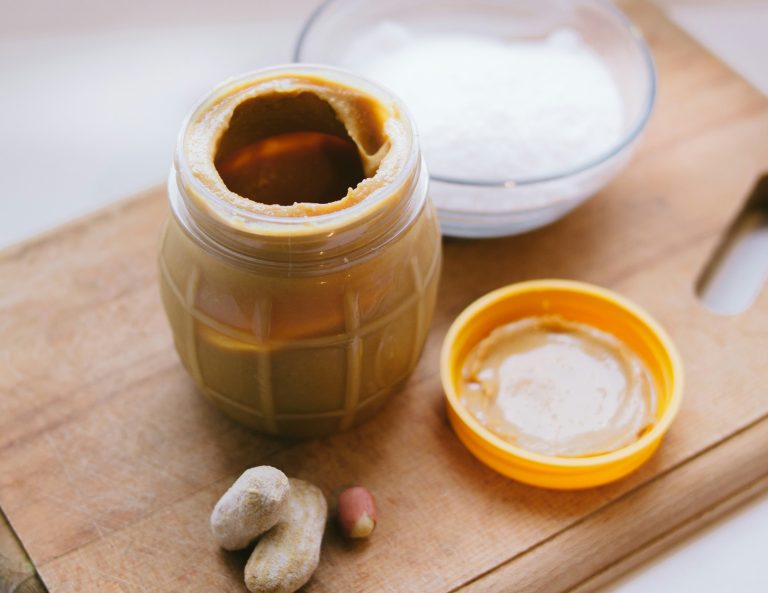Homemade peanut butter dog treats can be a great source of protein and healthy fats for your dog. However, it is more difficult for dogs to digest fat. High fat can cause stomach problems, including vomiting, diarrhea, fatigue, and loss of appetite.
Peanut butter can be a pretty healthy snack for dogs (as long as it’s not packed with added sugar and salt), as it provides them with plenty of vitamin B, vitamin E, and niacin, as well as healthy protein and fat.
CONTENT:
- What does peanut butter contain?
- Benefits of peanut butter for dogs
- Warnings before giving your dog homemade peanut butter treats
- Recipes for homemade peanut butter dog treats
What does peanut butter contain?
Peanut butter is a rich source of essential nutrients and offers a variety of health benefits. In addition to the delicious taste, peanut butter contains the following nutritional components:
- Protein: Peanut butter is a good source of protein, essential for tissue development and repair. Protein is essential for maintaining and building muscle mass.
- Healthy Fats: Although peanut butter is high in fat, it is mainly healthy fats, including monounsaturated and polyunsaturated fatty acids. These fats are beneficial for heart health and can help lower LDL (“bad” cholesterol) levels.
- Fiber: Peanut butter contains dietary fiber, which can help maintain a healthy digestive system and help manage body weight.
- Vitamin E: It is an antioxidant vitamin present in peanut butter, having a role in protecting cells against oxidative stress and maintaining skin health.
- Niacin (vitamin B3): This B vitamin is important for energy metabolism and can help maintain healthy skin, nervous system and other body functions.
- Folate (vitamin B9): Folate is important for cell formation and division, contributing to the synthesis of DNA and RNA.
- Magnesium: Peanut butter also provides magnesium, an essential mineral for the normal functioning of muscles, nerves and the immune system.
- Iron: Although the amounts of iron in peanut butter may be relatively small, it helps carry oxygen throughout the body and maintain healthy blood.
- Zinc: Zinc is an essential mineral found in peanut butter that plays a role in immune system function, wound healing and protein synthesis.
It’s important to note that despite its benefits, peanut butter is calorie dense, so moderation is key. Excessive consumption can contribute to total caloric intake and influence weight. In addition, it would be advisable to choose peanut butter variants without added sugar and other unhealthy ingredients.
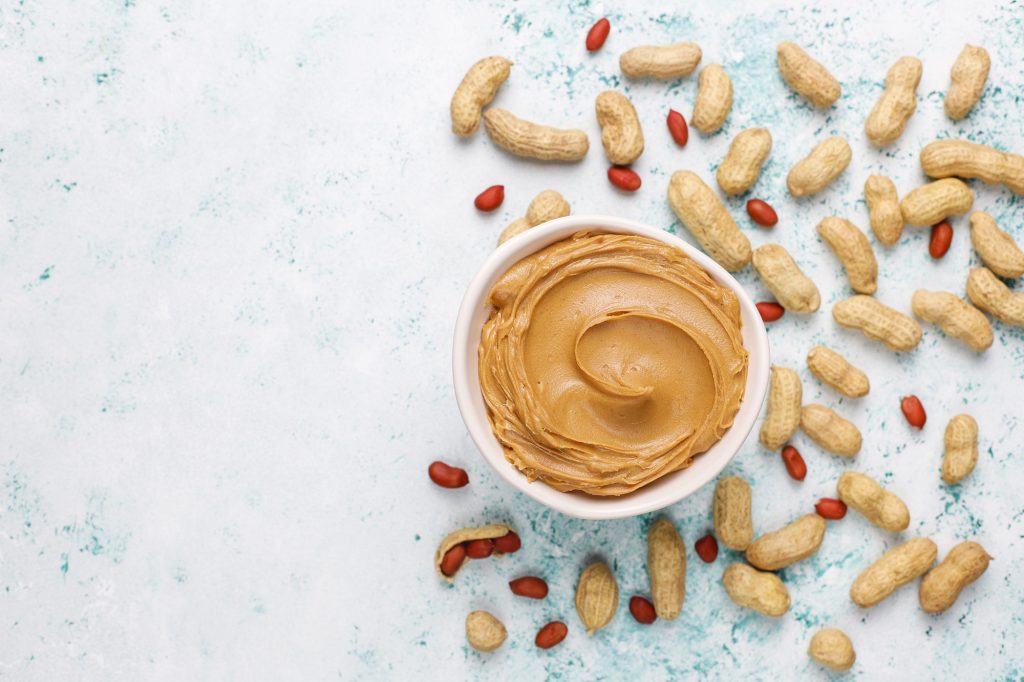
Benefits of peanut butter for dogs
Peanut butter is not only a delicious treat for their owners, but also a great source of essential nutrients for dogs’ health. This popular food, enriched with protein, healthy fats and essential vitamins, offers a number of nutritional benefits that contribute to the overall well-being of your four-legged companion.
So homemade peanut butter dog treats will bring the it following benefits:
- Protein for muscle development and maintenance: Protein is fundamental to building and maintaining muscle mass. Peanut butter provides these essential building blocks, helping to develop and maintain healthy musculature in dogs.
- Healthy fats for cardiovascular support: Healthy fats, such as those found in peanut butter, support heart and cardiovascular health. Monounsaturated and polyunsaturated fatty acids help keep LDL cholesterol levels within normal limits, helping to prevent heart problems.
- Vitamin E for healthy skin and shiny coat: Peanut butter is an excellent source of vitamin E, an antioxidant essential for maintaining healthy skin and coat in dogs. This vitamin helps protect cells from oxidative stress and maintain a shiny coat.
- Immune System Support: Peanut butter contains essential nutrients that can support your dog’s immune system. This means that your silent friend has a greater resistance to infection and disease, thus maintaining his vitality in the long term.
- Providing energy: The fats and proteins in peanut butter provide sustained energy, giving your dog the resources to go about his daily activities with energy and enthusiasm. This is an excellent choice for dogs with high levels of physical activity.

Warnings before giving your dog homemade peanut butter treats
Although peanut butter can be a delicious and nutritious snack for dogs, there are some important caveats you should consider before giving this food to your four-legged friend:
- Food allergies: Some dogs can develop food allergies, including peanuts. Before introducing peanut butter to your dog’s diet, offer a small amount and observe his reaction. Allergy symptoms may include itching, redness, swelling or diarrhea.
- Calorie content: Peanut butter is calorie dense and can contribute to dog weight gain if offered in large amounts. Be sure to adjust your daily food portions accordingly to maintain a healthy weight.
- Fat Content: Although the healthy fats in peanut butter are beneficial, an excessive amount can cause digestive problems in some pets. Start with small amounts and monitor your dog’s reaction.
- Peanut Butter Variations: Choose a natural peanut butter with no added sugar, salt or other unhealthy additives. Some commercial products may contain ingredients that are not suitable for dogs.
- Xylitol: Avoid peanut butter that contains xylitol. This artificial sweetener is toxic to dogs and can cause liver failure and other serious health problems.
- Supervision: When offering treats or other peanut butter treats, always supervise the dog to make sure there is no risk of swallowing large pieces or choking.
- Moderate amounts: Limit the amount of peanut butter you eat to avoid excess fat and calories. A teaspoon or two can be enough for a delicious snack.
Before making any significant changes to your dog’s diet, it is always recommended to speak with your veterinarian to ensure that the foods offered are consistent with your dog’s specific nutritional needs.
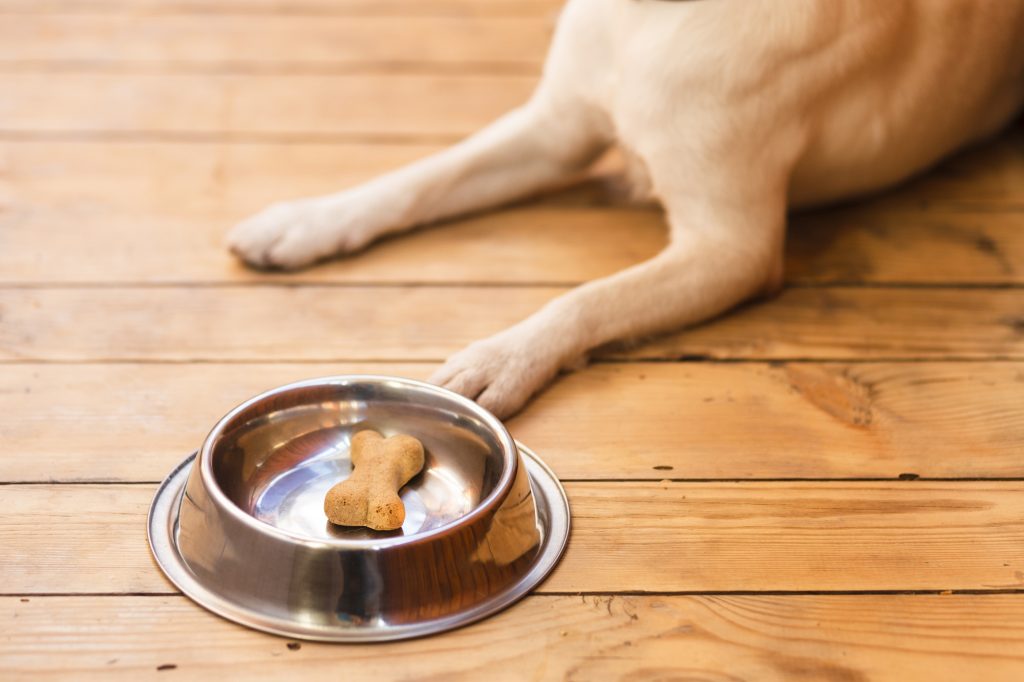
Recipes for homemade peanut butter dog treats
Now that we’ve seen how the peanut butter works, it’s time to start cooking. You will find 3 simple recipes, with ingredients that everyone has at home. The cooking method for those homemade peanut butter dog treats is simple and fast, and the results will be delicious.
Recipe 1: Peanut Butter Banana Cookies
Those homemade peanut butter dog treats combines the rich taste of natural peanut butter with the sweetness of ripe bananas, providing a unique taste experience for your four-legged friend. With a crunchy texture on the outside and a soft consistency on the inside, these biscuits are perfect for treating dogs during training or as a healthy snack between meals.
With nutritional benefits including protein, healthy fats and vitamins, these biscuits will not only delight your dog’s taste buds, but will also help maintain their health and vitality. By being prepared at home, you can control the ingredients and ensure that you give your non-talking friend a delicious and balanced snack.
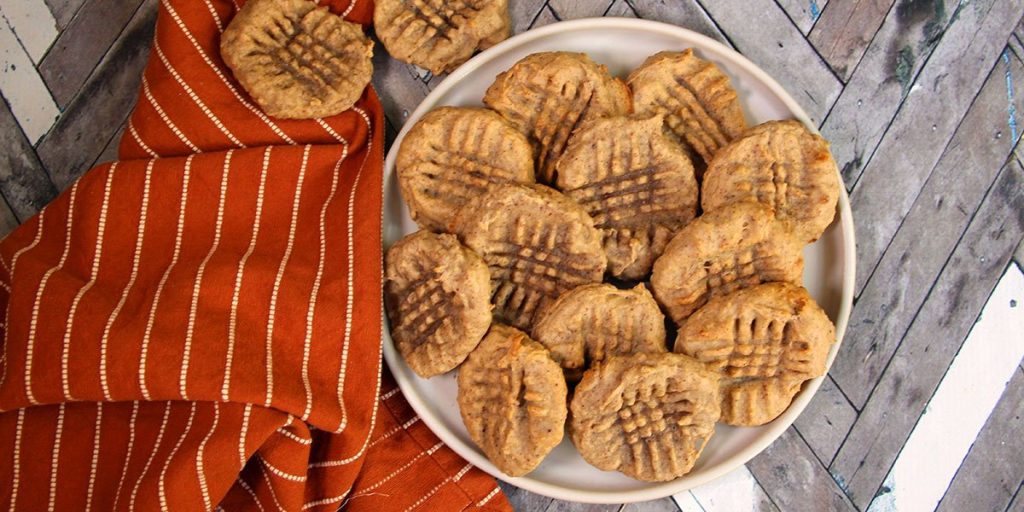
Ingredients:
- 1 cup wholemeal flour
- 1/2 cup natural peanut butter
- 1 ripe banana, mashed
- 1 egg
- 1/4 cup of water
Instructions:
- Preheat the oven to 175°C.
- In a large bowl, whisk together the flour, peanut butter, mashed banana, and egg.
- Add water gradually and mix until you get a smooth dough.
- Roll out the dough on a floured surface and use cookie cutters.
- Place the biscuits on a baking tray and bake for 10-12 minutes or until golden.
- Allow them to cool before giving to your dog.
Nutritional information (approximate for entire recipe):
- Calories: 1200 kcal
- Protein: 28g
- Fats: 60g
- Carbs: 130g
- Fibre: 15g
Calories per biscuit (approximate):
- It depends on the size of the biscuit, but roughly, 1 biscuit would contain about 40-50 kcal.
How much to give the dog per day:
- The amount of biscuits you should give your dog depends on its size, age and activity level. Consult your veterinarian to determine your dog’s specific needs.
Circumstances of offer:
- Biscuits can be offered as a reward during training, as a snack between meals or simply as a treat for your dog.
- Pay attention to the total calorie intake from treats and the dog’s daily diet to avoid excess weight.
Recipe 2: Frozen Yogurt Peanut Butter Candies
Frozen Yogurt Peanut Butter Treats are a delicious and healthy treat for your dogs. This simple and nutritious recipe brings together the benefits of peanut butter and yogurt for a refreshing and tasty experience for your four-legged friend.
With a soft and comforting texture, these candies are prepared in a few simple steps. Plain yogurt adds a nice creaminess, while peanut butter provides a touch of richness and essential protein. The spoonful of honey brings a natural sweetness without adding extra sugar.
These candies can be individually portioned into ice cubes or cupcake liners, giving your dog a refreshing treat on hot days or after intense activity. Freezing for at least 2 hours turns these treats into a comforting and nutritious treat.
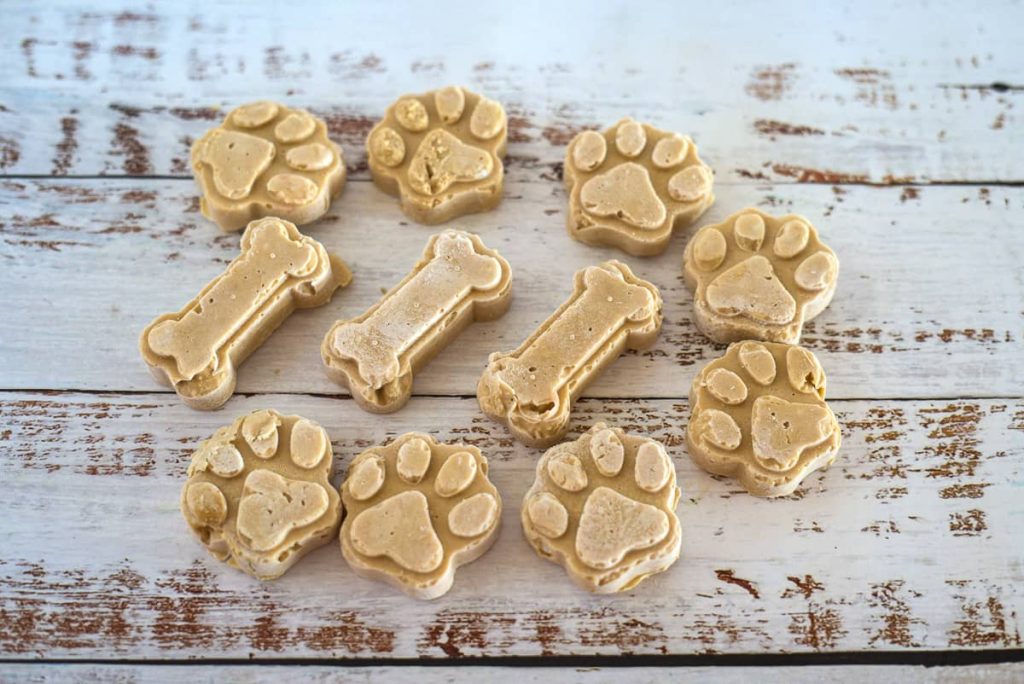
Ingredients:
- 1 cup of natural yogurt
- 1/2 cup natural peanut butter
- 1 tablespoon of honey
Instructions:
- Mix the yogurt, peanut butter, and honey in a bowl until smooth.
- Pour mixture into ice cube trays or use cupcake liners to create individual servings.
- Freeze for at least 2 hours or until candy is solid.
- Offer them to your dog as a refreshing and delicious treat.
Nutritional information (approximate for entire recipe):
- Calories: 600 kcal
- Protein: 15g
- Fats: 40g
- Carbs: 45g
- Fiber: 3g
Calories per candy (approx):
- It depends on the size of the form, but roughly, 1 candy would contain about 20-30 kcal.
How much to give the dog per day:
- The amount of treats you should give depends on your dog’s size, age and activity level. These candies can be offered as a reward or snack, so make sure they are included in your recommended daily caloric total.
Circumstances of offer:
- These frozen treats are ideal for giving your dog a refreshing treat on hot days.
- They can be used as entertainment for dogs during training or at times when you want to give them something special.
Recipe 3: Oatmeal and Peanut Butter Rolls
Oatmeal and Peanut Butter Rolls are a delicious and healthy option to treat your dog. This simple recipe brings together nutritious ingredients like rolled oats, natural peanut butter and honey for a balanced and nutritious snack.
With a soft and tasty texture, these rolls are quick to prepare and can be offered as a reward or snack at any time of the day. Oatmeal provides important fiber for healthy digestion, while peanut butter contributes protein and healthy fats. The spoonful of honey adds a natural touch of sweetness without the need for added unhealthy sugar.
The rolls can be shaped into the right size for your dog and left to harden in the fridge for the perfect consistency. By offering these rolls as a reward, you will provide not only a delicious snack, but also a source of healthy energy for your four-legged companion.

Ingredients:
- 1 cup oatmeal
- 1/2 cup natural peanut butter
- 1/4 cup honey
Instructions:
- In a bowl, mix the oatmeal, peanut butter, and honey until smooth.
- Form small rolls from the mixture, placing them on a tray.
- Place the tray in the fridge for at least 30 minutes to allow the rolls to harden.
- Give your dog these delicious rolls as a reward or snack.
Nutritional information (approximate for entire recipe):
- Calories: 800 kcal
- Protein: 16g
- Fat: 32g
- Carbs: 110g
- Fibers: 10g
Calories per roll (approx):
- It depends on the size of the roll, but roughly, 1 roll would contain about 40-50 kcal.
How much to give the dog per day:
- The amount of rolls you should give depends on your dog’s size, age and activity level. These rolls can be included as a reward or snack in the recommended daily caloric total.
Circumstances of offer:
- These rolls are great to give as a reward during workouts or as a healthy snack between meals.
- They can also be suitable for active dogs that require an additional source of energy.

